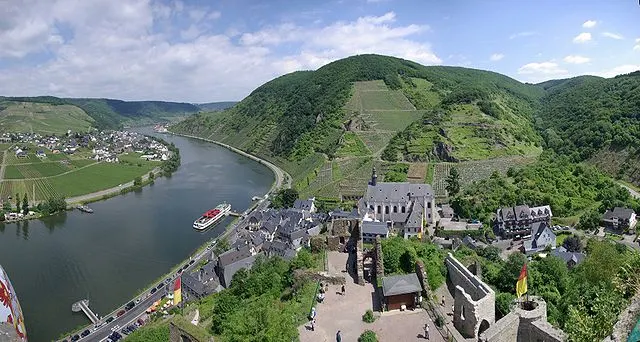It may be the cheesiest title ever given to a town west of the Rhineland-Palatinate, however everything has its explanation, and in the case of the German town of Beilstein we would have to take two things into account: 1. the town is it has been perfectly preserved since the Middle Ages and has the reputation of being the most beautiful town on the Moselle, and 2. Beilstein is on the route of Romantic Germany.
 |
| Beilstein Rhineland-Palatinate |
On the route of Romantic Germany
Sitting on the banks of the Moselle River since the 9th century, Beilstein is visited by no less than 3 million tourists each year, and is a mandatory stopping point on all Rhine and Moselle cruises. Such success is due to the fact that we are facing the most authentic and photogenic town in the Moselle region, whose rich and checkered history has curiously resulted in the perfect preservation of its original half-timbered houses and streets.
 |
| Panoramic of Beilstein and the Moselle |
Beilstein enjoyed city status practically from its origins, always under the protectorate of counts and archbishops belonging to the most powerful families in the region. In 1689 his luck changed, and the French took the city in the context of the Nine Years' War. It was a short-lived invasion, yet nearby cities like Cochem were completely razed. In 1794 the French returned and this time to stay, and Napoleon's army freed Beilstein from the servitude of its former owners during the 20 years that its hegemonic dream lasted. Far from being an advantage, it seems that this situation harmed Beilstein, who later joined the German Confederation with a decimated and extremely poor population or in the process of emigration.
And this is where the pseudonym of the sleeping beauty of the Moselle would make sense, since Beilstein would fall into a deep sleep for more than 100 years, and while the rest of the Moselle region changed and evolved with the course of time, in Beilstein had neither population nor sufficient resources to undertake these changes, with which, paradoxically, the people achieved something unusual in the region: to remain anchored in time.
 |
| Beilstein Rhineland-Palatinate |
Stroll through Beilstein
Beilstein is a small town, with steep and narrow streets dotted today with tiny cafes, taverns, restaurants and hostels. Its population does not exceed 160 inhabitants, however in the summer months it is most likely that we will find it crowded with tourists. We can stop to admire the remains of the old wall, the market square and the town hall –which date back to 1322–, the church of San Cristóbal or the facade of a small art gallery that in the past housed the town's synagogue.
But the most interesting thing for me about Beilstein is wandering its alleys aimlessly, simply observing its half-timbered houses and the contrast with the stone on the floor, reading the names on the houses and admiring their state of conservation, paying attention to the plants that adorn any building and in general enjoying the clean air and the calm atmosphere of this medieval German town. From Beilstein we will get privileged views over the Moselle and the vineyards that dot its rugged banks, and then we can sit and enjoy a glass of the typical Riesling white wine of the region.
 |
| Beilstein Rhineland-Palatinate |
The visit to Beilstein should not take us more than one or two hours, and we can continue our tour of the Moselle region visiting the beautiful and lively city of Cochem - a cruise port on the Romantic Rhineland-Palatinate, arranging a wine tasting somewhere nearby vineyards such as Calmont or hiking and biking if the weather is good.
If we also plan to spend the night, we can stay in one of the campsites on the banks of the Moselle, or reserve one of the many rural houses that dot this region of Romantic Germany. If instead we prefer to end the day with dinner in a larger city, we have Koblenz an hour away, the same time it will take us to get closer to the Frankfurt Hahn airport if we end our trip through some of the greenest and quietest regions of Germany, grouped under the name Rhineland-Palatinate.